孔子在英语世界的影响
- 格式:doc
- 大小:25.50 KB
- 文档页数:4
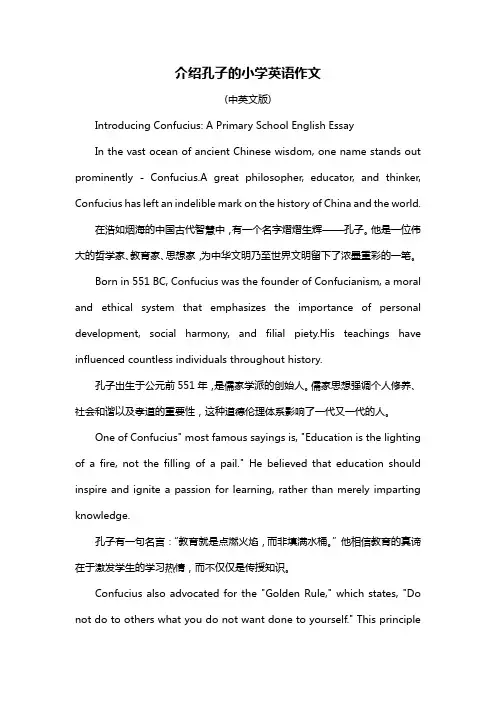
介绍孔子的小学英语作文(中英文版)Introducing Confucius: A Primary School English EssayIn the vast ocean of ancient Chinese wisdom, one name stands out prominently - Confucius.A great philosopher, educator, and thinker, Confucius has left an indelible mark on the history of China and the world.在浩如烟海的中国古代智慧中,有一个名字熠熠生辉——孔子。
他是一位伟大的哲学家、教育家、思想家,为中华文明乃至世界文明留下了浓墨重彩的一笔。
Born in 551 BC, Confucius was the founder of Confucianism, a moral and ethical system that emphasizes the importance of personal development, social harmony, and filial piety.His teachings have influenced countless individuals throughout history.孔子出生于公元前551年,是儒家学派的创始人。
儒家思想强调个人修养、社会和谐以及孝道的重要性,这种道德伦理体系影响了一代又一代的人。
One of Confucius" most famous sayings is, "Education is the lighting of a fire, not the filling of a pail." He believed that education should inspire and ignite a passion for learning, rather than merely imparting knowledge.孔子有一句名言:“教育就是点燃火焰,而非填满水桶。
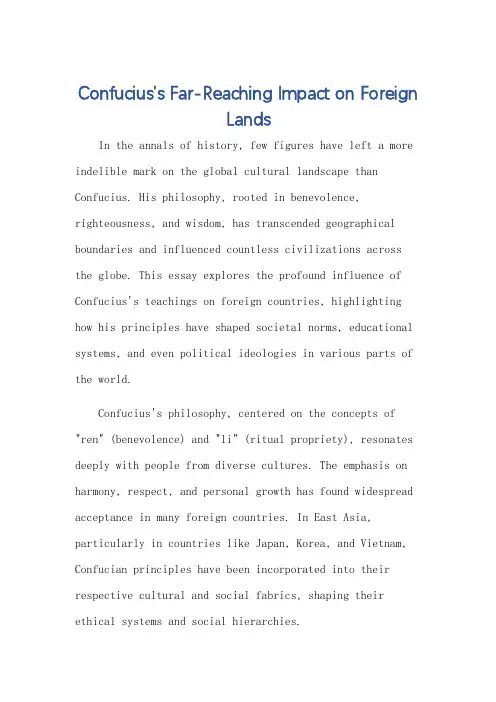
Confucius's Far-Reaching Impact on ForeignLandsIn the annals of history, few figures have left a more indelible mark on the global cultural landscape than Confucius. His philosophy, rooted in benevolence, righteousness, and wisdom, has transcended geographical boundaries and influenced countless civilizations across the globe. This essay explores the profound influence of Confucius's teachings on foreign countries, highlighting how his principles have shaped societal norms, educational systems, and even political ideologies in various parts of the world.Confucius's philosophy, centered on the concepts of "ren" (benevolence) and "li" (ritual propriety), resonates deeply with people from diverse cultures. The emphasis on harmony, respect, and personal growth has found widespread acceptance in many foreign countries. In East Asia, particularly in countries like Japan, Korea, and Vietnam, Confucian principles have been incorporated into their respective cultural and social fabrics, shaping their ethical systems and social hierarchies.In Japan, for instance, Confucian values have been instrumental in shaping the country's emphasis on loyalty, respect for authority, and the importance of education. These values are reflected in Japanese society, where hierarchy and seniority play significant roles in decision-making and interpersonal relationships. Similarly, in Korea, Confucianism has influenced the strong emphasis on filial piety and respect for elders, which are deeply ingrained in Korean culture.Moreover, Confucius's educational philosophy has had a significant impact on foreign education systems. His belief in the importance of lifelong learning and the equality of educational opportunities has influenced educationalpolicies and practices worldwide. In many countries, Confucian principles have been incorporated into their curricula, promoting a holistic approach to education that emphasizes moral, intellectual, and emotional growth.In the West, Confucius's influence has been more recent but no less significant. Western scholars and thinkers have increasingly turned to Confucian philosophy for insights on ethics, politics, and social organization. The principlesof benevolence and harmony have found resonance in Western societies, particularly in the face of increasing globalization and the need for cross-cultural understanding. In the political realm, Confucian ideas have influenced the development of democratic systems in some countries.The emphasis on collective well-being and the role of the state in promoting social harmony has been a source of inspiration for political theorists and practitioners seeking to create more inclusive and just political systems. Furthermore, Confucius's philosophy has also influenced business ethics and management practices in foreign countries. The principles of integrity, trust, and mutual respect have been adopted by many businesses as the foundation for successful organizational cultures and business relationships.In conclusion, the influence of Confucius on foreign lands is vast and multifaceted. His philosophy has shaped societal norms, educational systems, political ideologies, and business practices in numerous countries around the world. As the world continues to grow more interconnected, the relevance and significance of Confucian principles arelikely to increase, providing valuable insights andguidance for addressing the challenges and opportunities of the modern era.**孔子对国外的影响**在历史的长河中,鲜有人物能像孔子一样在全球文化景观中留下如此不可磨灭的印记。
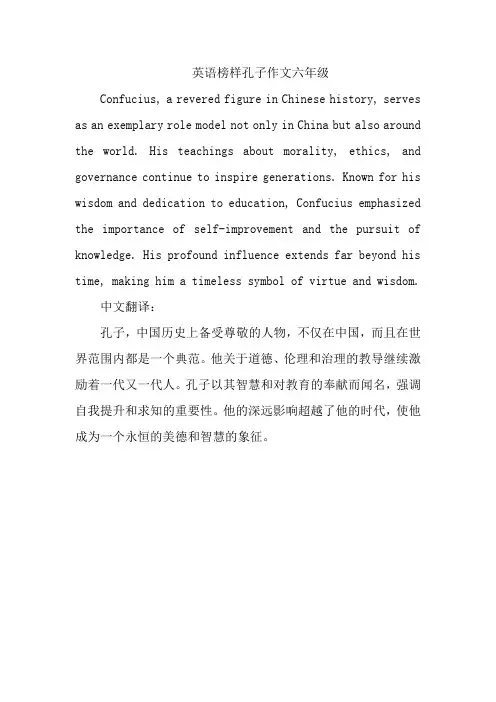
英语榜样孔子作文六年级
Confucius, a revered figure in Chinese history, serves as an exemplary role model not only in China but also around the world. His teachings about morality, ethics, and governance continue to inspire generations. Known for his wisdom and dedication to education, Confucius emphasized the importance of self-improvement and the pursuit of knowledge. His profound influence extends far beyond his time, making him a timeless symbol of virtue and wisdom.
中文翻译:
孔子,中国历史上备受尊敬的人物,不仅在中国,而且在世界范围内都是一个典范。
他关于道德、伦理和治理的教导继续激励着一代又一代人。
孔子以其智慧和对教育的奉献而闻名,强调自我提升和求知的重要性。
他的深远影响超越了他的时代,使他成为一个永恒的美德和智慧的象征。
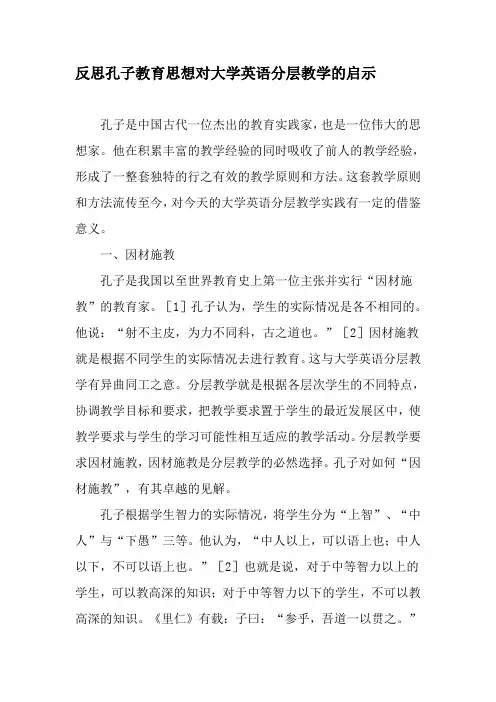
反思孔子教育思想对大学英语分层教学的启示孔子是中国古代一位杰出的教育实践家,也是一位伟大的思想家。
他在积累丰富的教学经验的同时吸收了前人的教学经验,形成了一整套独特的行之有效的教学原则和方法。
这套教学原则和方法流传至今,对今天的大学英语分层教学实践有一定的借鉴意义。
一、因材施教孔子是我国以至世界教育史上第一位主张并实行“因材施教”的教育家。
[1]孔子认为,学生的实际情况是各不相同的。
他说:“射不主皮,为力不同科,古之道也。
”[2]因材施教就是根据不同学生的实际情况去进行教育。
这与大学英语分层教学有异曲同工之意。
分层教学就是根据各层次学生的不同特点,协调教学目标和要求,把教学要求置于学生的最近发展区中,使教学要求与学生的学习可能性相互适应的教学活动。
分层教学要求因材施教,因材施教是分层教学的必然选择。
孔子对如何“因材施教”,有其卓越的见解。
孔子根据学生智力的实际情况,将学生分为“上智”、“中人”与“下愚”三等。
他认为,“中人以上,可以语上也;中人以下,不可以语上也。
”[2]也就是说,对于中等智力以上的学生,可以教高深的知识;对于中等智力以下的学生,不可以教高深的知识。
《里仁》有载:子曰:“参乎,吾道一以贯之。
”曾子曰:“唯!”子出,门人问曰:“何谓也?”曾子曰:“夫子之道,忠恕而已矣!”[2]从这里可以看出,孔子认为曾经过努力学习,智力得到提高,所以才传授其高深的知识,而这种高深的知识是无法传授给智力暂时比较低的学生。
孔子这种根据不同学生智力发展水平,进行不同教育的方法符合客观教育规律。
智力较高的学生需要教给他们较高深的知识,才能满足他们的求知欲望,促进他们向更高层次发展。
智力较低的学生需要根据他们的实际情况,传授他们能够掌握接受的知识,使他们的知识架构一步步向前发展。
笔者认为分层教学中,需要以学生认知能力为基础,从学生实际英语水平及其接受英语知识的潜能,确定学生不同的层次,制定不同的教学目标、教学计划、教学方案、学生管理制度等,采用不同的教学方法进行教学活动,使各类学生在各自的最近发展区内得到最充分的发展,从而达到全体学生在各自不同的起点上进步的目的。
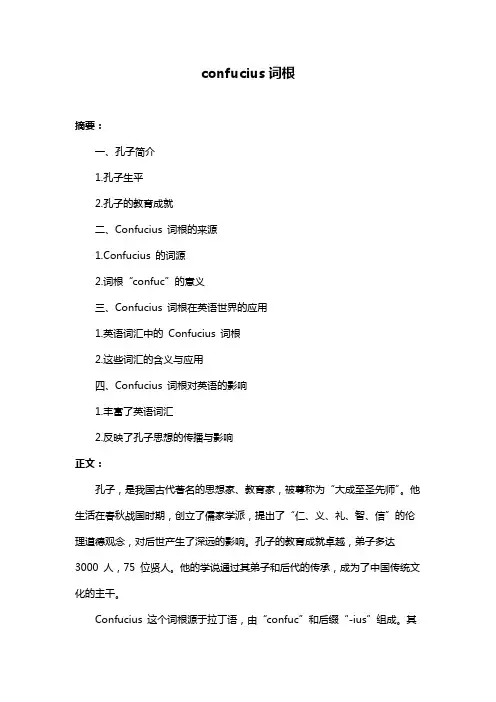
confucius词根
摘要:
一、孔子简介
1.孔子生平
2.孔子的教育成就
二、Confucius 词根的来源
1.Confucius 的词源
2.词根“confuc”的意义
三、Confucius 词根在英语世界的应用
1.英语词汇中的Confucius 词根
2.这些词汇的含义与应用
四、Confucius 词根对英语的影响
1.丰富了英语词汇
2.反映了孔子思想的传播与影响
正文:
孔子,是我国古代著名的思想家、教育家,被尊称为“大成至圣先师”。
他生活在春秋战国时期,创立了儒家学派,提出了“仁、义、礼、智、信”的伦理道德观念,对后世产生了深远的影响。
孔子的教育成就卓越,弟子多达3000 人,75 位贤人。
他的学说通过其弟子和后代的传承,成为了中国传统文化的主干。
Confucius 这个词根源于拉丁语,由“confuc”和后缀“-ius”组成。
其
中,“confuc”来自于孔子的拉丁名字“Confucius”。
这个词根在英语世界中广泛应用,许多与孔子及其思想有关的词汇都采用了这个词根。
在英语中,Confucius 词根的词汇丰富多样,如“Confucianism”(儒家学说)、“Confucian”(儒家的)等。
这些词汇在英语世界的应用,不仅反映了孔子思想的传播,也表现了其在英语世界的影响力。
Confucius 词根对英语的影响是深远的。
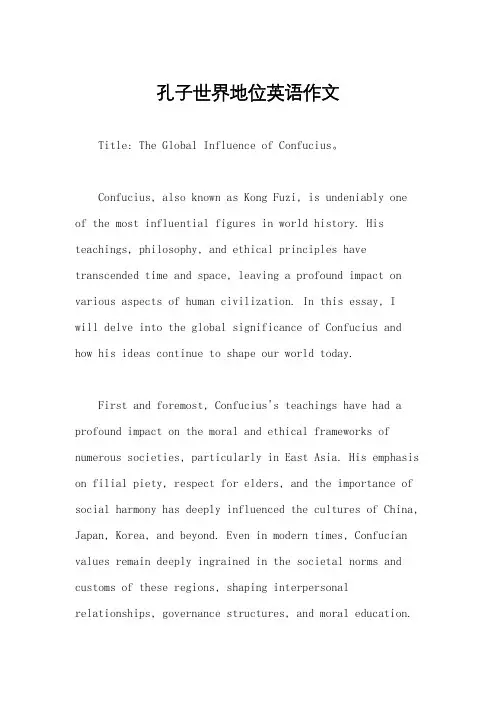
孔子世界地位英语作文Title: The Global Influence of Confucius。
Confucius, also known as Kong Fuzi, is undeniably one of the most influential figures in world history. His teachings, philosophy, and ethical principles have transcended time and space, leaving a profound impact on various aspects of human civilization. In this essay, Iwill delve into the global significance of Confucius and how his ideas continue to shape our world today.First and foremost, Confucius's teachings have had a profound impact on the moral and ethical frameworks of numerous societies, particularly in East Asia. His emphasis on filial piety, respect for elders, and the importance of social harmony has deeply influenced the cultures of China, Japan, Korea, and beyond. Even in modern times, Confucian values remain deeply ingrained in the societal norms and customs of these regions, shaping interpersonal relationships, governance structures, and moral education.Moreover, Confucianism has played a crucial role in shaping political ideologies and governance systems around the world. The emphasis on benevolent leadership, meritocracy, and the ruler's moral responsibility has been studied and adapted by political thinkers and leaders worldwide. From ancient Chinese emperors to contemporary statesmen, many have sought to incorporate Confucian principles into their governance strategies, aiming to promote stability, order, and ethical leadership.Furthermore, Confucius's emphasis on education as a means of personal and societal transformation has left a lasting legacy on global education systems. The Confucian ideal of lifelong learning and the pursuit of knowledge for self-improvement has inspired educational reforms and institutions worldwide. Even in the modern era, the Confucian emphasis on rigorous scholarship, moral education, and character development continues to shape educational practices and pedagogical approaches in various parts ofthe world.In addition to its influence on morality, politics, and education, Confucianism has also made significant contributions to various fields such as literature, art, and philosophy. Confucian ideas have inspired countless literary works, artistic expressions, and philosophical debates, both within East Asia and beyond. The enduring relevance of Confucianism in these cultural spheres underscores its status as a global cultural heritage that continues to inspire creativity, intellectual inquiry, and cross-cultural dialogue.Furthermore, the global spread of Confucianism through trade, migration, and cultural exchange has contributed to its enduring legacy. As Chinese communities have migrated and settled in various parts of the world, they have brought with them Confucian values, traditions, and practices, enriching the cultural tapestry of diverse societies. Additionally, the popularity of Confucianism among Western scholars and intellectuals has led to its integration into Western academic discourse, further enhancing its global influence and relevance.In conclusion, Confucius occupies a unique and revered position in world history due to the global impact of his teachings, philosophy, and ethical principles. From shaping moral values and governance systems to influencing education, culture, and philosophy, Confucianism continues to resonate with people around the world, transcending geographical and cultural boundaries. As we navigate the complexities of the modern world, the timeless wisdom of Confucius serves as a beacon of guidance, reminding us of the enduring relevance of his teachings in our quest for personal and societal harmony.。
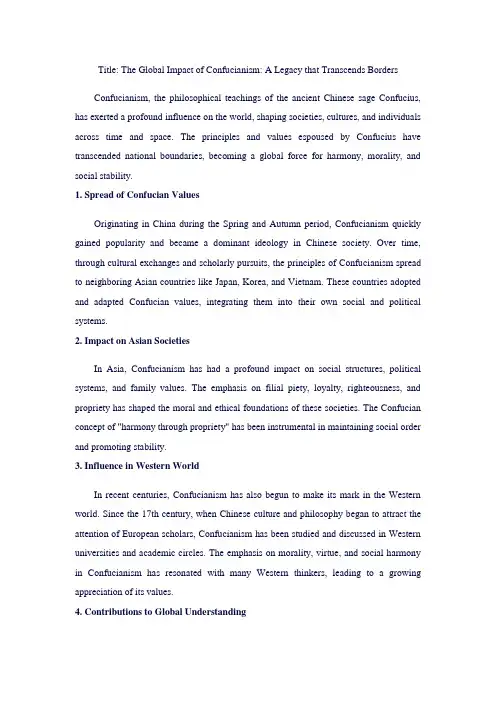
Title: The Global Impact of Confucianism: A Legacy that Transcends BordersConfucianism, the philosophical teachings of the ancient Chinese sage Confucius, has exerted a profound influence on the world, shaping societies, cultures, and individuals across time and space. The principles and values espoused by Confucius have transcended national boundaries, becoming a global force for harmony, morality, and social stability.1. Spread of Confucian ValuesOriginating in China during the Spring and Autumn period, Confucianism quickly gained popularity and became a dominant ideology in Chinese society. Over time, through cultural exchanges and scholarly pursuits, the principles of Confucianism spread to neighboring Asian countries like Japan, Korea, and Vietnam. These countries adopted and adapted Confucian values, integrating them into their own social and political systems.2. Impact on Asian SocietiesIn Asia, Confucianism has had a profound impact on social structures, political systems, and family values. The emphasis on filial piety, loyalty, righteousness, and propriety has shaped the moral and ethical foundations of these societies. The Confucian concept of "harmony through propriety" has been instrumental in maintaining social order and promoting stability.3. Influence in Western WorldIn recent centuries, Confucianism has also begun to make its mark in the Western world. Since the 17th century, when Chinese culture and philosophy began to attract the attention of European scholars, Confucianism has been studied and discussed in Western universities and academic circles. The emphasis on morality, virtue, and social harmony in Confucianism has resonated with many Western thinkers, leading to a growing appreciation of its values.4. Contributions to Global UnderstandingConfucianism's emphasis on humanity, benevolence, and universal principles of morality has fostered a sense of universal understanding and mutual respect among different cultures. In today's globalized world, where cultural diversity and conflicts are increasingly prominent, the teachings of Confucius offer valuable insights into promoting harmony and understanding among nations.5. ConclusionIn conclusion, Confucianism, through its universal principles of morality, virtue, and social harmony, has left a lasting impact on the world. Its influence has transcended national boundaries, shaping societies, cultures, and individuals across time and space. As we move into a new era of globalization, the teachings of Confucius continue to offer valuable guidance for promoting harmony, understanding, and progress among nations.。
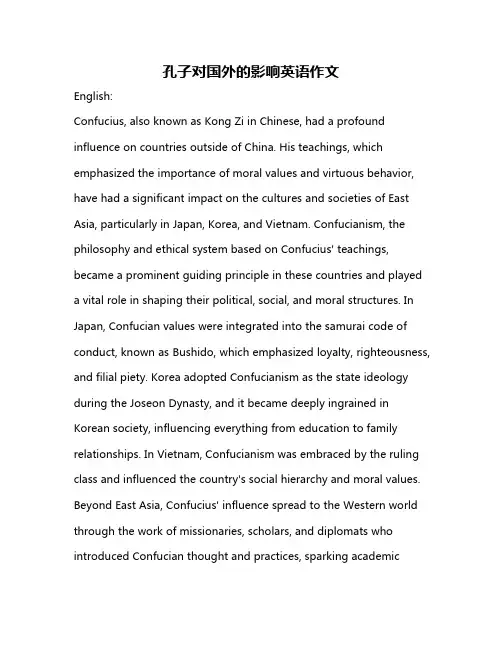
孔子对国外的影响英语作文English:Confucius, also known as Kong Zi in Chinese, had a profound influence on countries outside of China. His teachings, which emphasized the importance of moral values and virtuous behavior, have had a significant impact on the cultures and societies of East Asia, particularly in Japan, Korea, and Vietnam. Confucianism, the philosophy and ethical system based on Confucius' teachings, became a prominent guiding principle in these countries and played a vital role in shaping their political, social, and moral structures. In Japan, Confucian values were integrated into the samurai code of conduct, known as Bushido, which emphasized loyalty, righteousness, and filial piety. Korea adopted Confucianism as the state ideology during the Joseon Dynasty, and it became deeply ingrained in Korean society, influencing everything from education to family relationships. In Vietnam, Confucianism was embraced by the ruling class and influenced the country's social hierarchy and moral values. Beyond East Asia, Confucius' influence spread to the Western world through the work of missionaries, scholars, and diplomats who introduced Confucian thought and practices, sparking academicinterest and influencing Western perceptions of Chinese culture and civilization.中文翻译:孔子,也被称为孔子,在中国之外的国家产生了深远的影响。
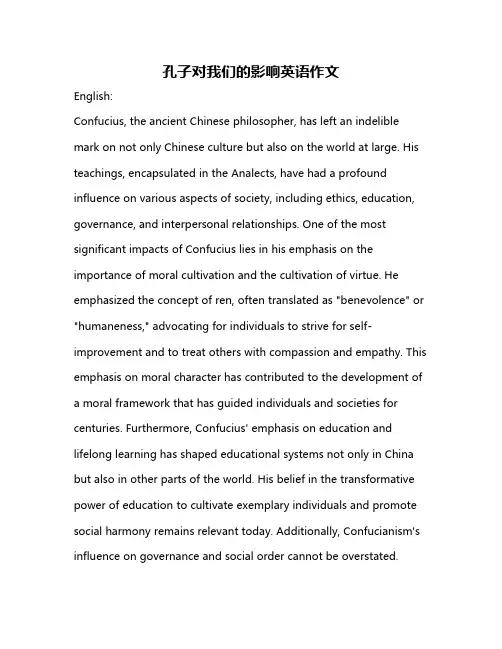
孔子对我们的影响英语作文English:Confucius, the ancient Chinese philosopher, has left an indelible mark on not only Chinese culture but also on the world at large. His teachings, encapsulated in the Analects, have had a profound influence on various aspects of society, including ethics, education, governance, and interpersonal relationships. One of the most significant impacts of Confucius lies in his emphasis on the importance of moral cultivation and the cultivation of virtue. He emphasized the concept of ren, often translated as "benevolence" or "humaneness," advocating for individuals to strive for self-improvement and to treat others with compassion and empathy. This emphasis on moral character has contributed to the development of a moral framework that has guided individuals and societies for centuries. Furthermore, Confucius' emphasis on education and lifelong learning has shaped educational systems not only in China but also in other parts of the world. His belief in the transformative power of education to cultivate exemplary individuals and promote social harmony remains relevant today. Additionally, Confucianism's influence on governance and social order cannot be overstated.Confucius proposed a hierarchical structure based on moral authority and benevolent leadership, advocating for rulers to govern with virtue and righteousness, prioritizing the welfare of the people. This concept has had a lasting impact on political philosophy and governance systems, shaping the principles of good governance and leadership worldwide. Overall, Confucius' teachings continue to resonate across cultures, serving as a guiding light for individuals and societies striving for moral excellence and harmonious coexistence.中文翻译:孔子,这位古代中国哲学家,不仅对中国文化产生了不可磨灭的影响,而且对整个世界也产生了深远的影响。
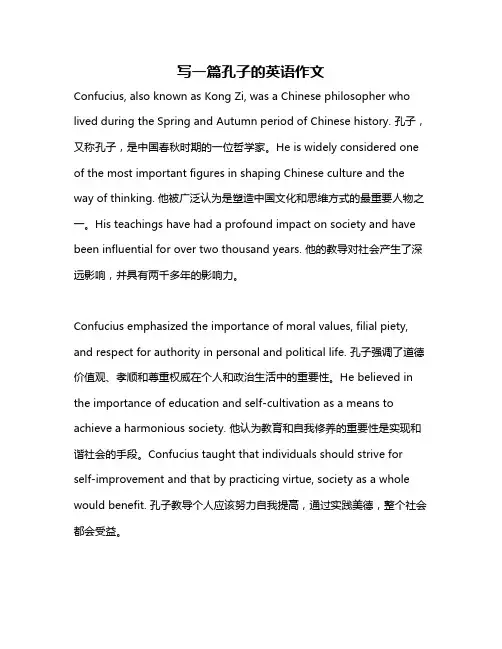
写一篇孔子的英语作文Confucius, also known as Kong Zi, was a Chinese philosopher who lived during the Spring and Autumn period of Chinese history. 孔子,又称孔子,是中国春秋时期的一位哲学家。
He is widely considered one of the most important figures in shaping Chinese culture and the way of thinking. 他被广泛认为是塑造中国文化和思维方式的最重要人物之一。
His teachings have had a profound impact on society and have been influential for over two thousand years. 他的教导对社会产生了深远影响,并具有两千多年的影响力。
Confucius emphasized the importance of moral values, filial piety, and respect for authority in personal and political life. 孔子强调了道德价值观、孝顺和尊重权威在个人和政治生活中的重要性。
He believed in the importance of education and self-cultivation as a means to achieve a harmonious society. 他认为教育和自我修养的重要性是实现和谐社会的手段。
Confucius taught that individuals should strive for self-improvement and that by practicing virtue, society as a whole would benefit. 孔子教导个人应该努力自我提高,通过实践美德,整个社会都会受益。
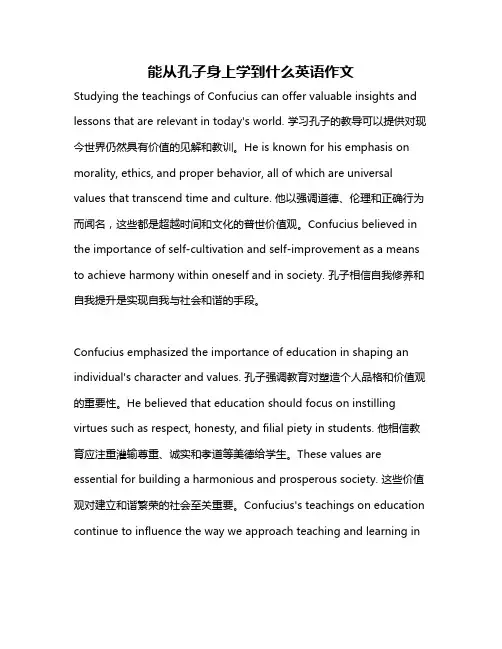
能从孔子身上学到什么英语作文Studying the teachings of Confucius can offer valuable insights and lessons that are relevant in today's world. 学习孔子的教导可以提供对现今世界仍然具有价值的见解和教训。
He is known for his emphasis on morality, ethics, and proper behavior, all of which are universal values that transcend time and culture. 他以强调道德、伦理和正确行为而闻名,这些都是超越时间和文化的普世价值观。
Confucius believed in the importance of self-cultivation and self-improvement as a means to achieve harmony within oneself and in society. 孔子相信自我修养和自我提升是实现自我与社会和谐的手段。
Confucius emphasized the importance of education in shaping an individual's character and values. 孔子强调教育对塑造个人品格和价值观的重要性。
He believed that education should focus on instilling virtues such as respect, honesty, and filial piety in students. 他相信教育应注重灌输尊重、诚实和孝道等美德给学生。
These values are essential for building a harmonious and prosperous society. 这些价值观对建立和谐繁荣的社会至关重要。
我最喜欢的历史人物英语作文孔子Confucius is my favorite historical figure because of his profound wisdom and teachings that have shaped the moral values of the Chinese people for centuries. 孔子是我最喜欢的历史人物,因为他深奥的智慧和教导已经塑造了中国人民几个世纪以来的道德价值观。
His emphasis on filial piety, respect for elders, and the importance of education continue to resonate with people around the world. 他对孝道、敬老和教育的强调仍然与世界各地的人们产生共鸣。
Confucius believed in the idea of leading by example and emphasized the importance of self-cultivation before trying to influence others. 孔子相信以身作则的理念,强调在影响他人之前,自我修养的重要性。
His teachings on the importance of virtuous conduct and ethical behavior have had a lasting impact on Chinese society and continue to be studied and revered to this day. 他对品德行为的重要性的教导对中国社会产生了持久的影响,并且至今仍在被研究和崇敬。
One of the reasons why I admire Confucius is his emphasis on the importance of lifelong learning and self-improvement. 我钦佩孔子的原因之一,是他强调终身学习和自我提升的重要性。
孔子的介绍英语Confucius, known in English as Confucius, was a renowned Chinese philosopher and educator who lived during the 7th century BC. Born into a humble family, Confucius spent his life teaching and promoting the values of love, respect, and harmony. His influence has been feltthroughout China and beyond, making him one of the most significant figures in Eastern philosophy.Confucius's philosophy, known as Confucianism,强调仁爱、忠诚、尊重和谦逊。
He believed that everyone should striveto be a virtuous person, one who practices these values in their daily life. He taught that respect for elders and authorities is fundamental to maintaining social order and harmony. 同时,Confucius also emphasized the importance of education, believing that it was the key to personal growth and societal progress.Confucius's teaching methods were unique and innovative. He emphasized active learning through discussion and debate, encouraging students to think critically and independently. He also believed that learning should be enjoyable and engaging, not just a rote memorization of facts.Confucius's influence has been felt in various aspectsof Chinese culture, including art, literature, politics,and even daily life. His teachings have been incorporated into Chinese law and have shaped the way Chinese peopleview their roles in society. Confucian values such as respect, harmony, and virtue are still highly valued in Chinese culture today.Outside of China, Confucius's influence has also been felt. His teachings have been translated into various languages and have influenced thinkers and philosophers worldwide. The United Nations Educational, Scientific and Cultural Organization (UNESCO) has even designatedConfucius as one of the world's most important thinkers, recognizing his significant contribution to human civilization.In conclusion, Confucius is a remarkable figure in both Chinese and global history. His philosophy of love, respect, and harmony has shaped the way people think and behave for centuries. His innovative teaching methods and dedicationto personal growth have made him a role model for educators worldwide. As we move forward in the 21st century, it isimportant to remember the wisdom of Confucius and the valuable contributions he has made to human civilization.**孔子:东方智慧的典范**孔子,这位在公元前7世纪的中国著名哲学家和教育家,以孔子的名字为英语世界所熟知。
孔子英语作文90词Confucius, a renowned Chinese philosopher, has been a beacon of wisdom for generations. His teachings, centered around love, respect, and harmony, have shaped the cultural and ethical landscape of East Asia. His philosophy emphasizes the importance of personal growth and morality, urging individuals to seek inner peace and wisdom through continuous self-improvement. Confucius's influence extends beyond the East, with his thoughts finding resonance in the West as well. His legacy is a testament to the enduring power of wisdom and morality in guiding human beingstowards a more harmonious and compassionate world.孔子:普世的哲学家孔子,这位著名的中国哲学家,数世纪以来一直是智慧的明灯。
他的教义以爱、尊重和和谐为核心,塑造了东亚的文化和道德风貌。
他的哲学强调个人成长和道德的重要性,敦促人们通过不断自我完善来寻求内心的平静和智慧。
孔子的影响力超越东方,在西方也找到了共鸣。
他的遗产证明了智慧和道德在引导人类走向更加和谐、富有同情心的世界方面的持久力量。
Confucius's influence on society is profound and diverse. His ethical framework, known as Confucianism, promotes the value of family, community, and social harmony. This philosophy emphasizes the importance of filial piety towards one's parents, loyalty towards one's superiors, and respect towards elders. Confucius believed that thesevirtues were essential for maintaining social order and promoting personal growth.孔子对社会的影响深远且多元。
Confucius: A Remarkable EducatorConfucius, a luminary in the annals of history, stands tall as a beacon of wisdom and morality. His influence extends far beyond the confines of his native China, reaching across the globe to shape the lives of millions. His teachings, encapsulated in the Analects, are a testament to his profound understanding of human nature and society. What sets Confucius apart as an educator is his emphasis on personal growth, ethical conduct, and the harmonious coexistence of individuals within society.Confucius' belief in the power of education is evident in his assertion that "the noble man is constantly in pursuit of knowledge, and the common man is constantly in pursuit of material wealth." He emphasized the importance of lifelong learning, urging his disciples to continually seek wisdom and understanding. This approach to education is not confined to academic knowledge; it extends to the cultivation of moral character and ethical values.Confucius' teaching methods were innovative and inclusive. He emphasized the use of inductive reasoning, encouraging his disciples to observe, reflect, and drawconclusions based on their own experiences. He valued diversity and believed that students should be treated as individuals with unique strengths and weaknesses. This individualized approach to education fostered a learning environment that was both nurturing and challenging.The ethical framework outlined by Confucius is deeply rooted in the concept of "ren," or benevolence. He advocated for a society where individuals treat others with respect and compassion, seeking harmony rather than conflict. This ethical framework has had profound implications for social order and moral values, promoting a culture of inclusivity and mutual respect.Confucius' impact on society is immeasurable. His teachings have been instrumental in shaping the cultural and ethical landscapes of East Asia, particularly in China, Japan, and Korea. The Confucian values of respect, duty, and harmony have influenced social institutions, political systems, and even daily interactions. The influence of Confucius extends beyond the East, as his teachings have found resonance in the West, particularly in the fields of philosophy, ethics, and education.In conclusion, Confucius stands as a remarkableeducator whose wisdom and morality have transcended the ages. His emphasis on personal growth, ethical conduct, and harmonious coexistence within society provides a timeless framework for education and social progress. His legacy is not confined to a single culture or era; it is a global phenomenon that continues to inspire and guide countless individuals on their paths to wisdom and enlightenment.**孔子:卓越的教育家**孔子,这位历史长河中的璀璨明星,以其智慧和道德的光辉照耀着世界。
有关孔子的英语作文小学In the vast expanse of Chinese history, one figure stands tall above the rest, a beacon of wisdom and morality. This individual, whose teachings have shaped the cultural identity of countless millions, is none other than Confucius. His influence extends far beyond the borders of China, touching the lives of people across the globe. Evenin the modern era, when technology and knowledge are advancing at unprecedented speeds, the wisdom of Confucius remains relevant and valuable.Born in the 500s BCE, Confucius lived during a periodof significant social and political upheaval. Despite these challenges, he dedicated his life to the pursuit of knowledge and the dissemination of his philosophy. His teachings emphasized the importance of morality, ethics,and social harmony. He believed that through education and self-improvement, individuals could achieve personal growth and contribute to the betterment of society.One of the core principles of Confucianism is the concept of "ren," which translates to "humaneness" or "kindness." This principle promotes compassion, empathy,and respect for others. Confucius believed that by treating others with kindness and compassion, individuals could foster positive relationships and create a more harmonious society. This philosophy is as relevant today as it was in ancient times, as it serves as a reminder to always treat others with respect and kindness.Another key aspect of Confucianism is the importance of education. Confucius believed that education was the key to personal growth and societal progress. He advocated for a system of public education and emphasized the value of lifelong learning. His belief in the power of education has had a profound impact on Chinese society, as it has helped to create a culture that values knowledge and learning.Confucius' influence is not limited to China alone. His teachings have been translated into various languages and have had a significant impact on global culture and philosophy. His ideas about morality, ethics, and social harmony have resonated with people across the globe, making him a truly universal figure.In conclusion, Confucius remains a timeless teacher whose wisdom and morality continue to inspire and guidepeople around the world. His teachings about kindness, compassion, and the importance of education are as relevant today as they were centuries ago. As we navigate the complexities of modern life, the wisdom of Confucius serves as a valuable compass, guiding us towards a more harmonious and fulfilling existence.**孔子:一位永恒的导师**在中国悠久的历史长河中,有一位伟人屹立不倒,成为智慧和道德的典范。
Confucius: The Philosopher of Harmony andMoralityConfucius, also known as Kung Fu Zi, was a Chinese philosopher and thinker who lived during the Spring and Autumn Period. He is widely regarded as the founder of Confucianism, a philosophy that强调道德、礼仪、和谐与仁爱。
Confucius's teachings强调个人修养, social harmony, and respect for authority, making him a pivotal figure in East Asian culture and history.Born into a poor family, Confucius spent much of his early life as a scholar and teacher, traveling throughout China to share his wisdom and insights. He emphasized the importance of education, believing that it was the key to personal growth and societal progress. His philosophy advocated for a hierarchical social structure, with each individual playing their role in maintaining harmony and order.Confucius's influence extends far beyond the borders of China, with his teachings having a profound impact on East Asian culture, including Japan, Korea, and Vietnam. His philosophy continues to be studied and applied in modernsociety, serving as a guide for moral conduct and social interaction.Confucius's legacy is not just in the words he wrote or the teachings he imparted, but also in the example he setas a person of integrity and wisdom. His commitment to personal growth, social harmony, and respect for others serves as a reminder of the importance of these values in our own lives.**孔子:和谐与道德的哲学家**孔子,也称为孔夫子,是春秋时期的中国哲学家和思想家。
孔子在英语世界的影响
关于孔子,我们总习惯于把其冠名为中国的“至圣先师”,似乎他只是中国文化的代表而已,可事实上,一种先进文化的诞生和发展,不仅仅是对于本国,对于其他一些国家甚至整个世界,都必然有着举足轻重的影响。
1985年美国出版了《人民年鉴手册》列出世界十大思想家,孔子便被列为十大思想家之首;美国前总统里根曾经说:“孔子高贵的行谊与伟大的伦理道德思想,不仅影响了他的国人,也影响了全人类。
孔子学说世代相传,提示全世界人类丰富的为人处世原则”;《华盛顿邮报》曾经写道:“虽然孔子活在两千多年前,但他的教诲对今天世界的生活仍然具有重要的指导意义”;剑桥大学将孔子著作《论语》的部分章节作为中国文化的教学内容,而儒家仁者爱自己,更爱别人的思想,在世界各地都得到了验证……
当然,身为中国春秋人士的孔子肯定是不会讲英语的,可是以上诸事例足以说明,高贵的思想无所谓国籍也无所谓语言,中国古代连普通话是什么都不知道的孔圣人,不止是我们的圣人,在满嘴英文字母的西方人面前也照样是需要顶礼膜拜或者说苦心参详的哲学家。
文化无国界,这也许正是文化的魅力之所在吧。
事实上,在英语世界里,西方人对孔子及其学说的研究未必比我们少。
那么,我们先来看看他们对于孔子思想的解读。
对于一种思想的解读总是离不开同时代政治和经济的变革,这也正是思想的作用的厉害之处——作为指导的纲领和行动的依据,它可以推动一场改革甚至革命。
西方人正是充分地利用了孔子思想的这一点。
著名的汉学家威尔·杜伦在其著作《哲学概论》中不仅孔子学说的反宗教性,而且将孔子与苏格拉底与亚里士多德等而视之,说他们都“把道德和智慧看做一件事”,他们的教育目的是“使人格全面发展”。
这个言论很有意思,众所周知,苏格拉底和亚里士多德,无疑是西方古典哲学的代表人物,在英语世界也无疑是智慧和思想的化身,同时更重要的,他们代表的是一种向往自由、平等的文化憧憬,威尔·杜伦将孔子与此二位并列,足以说明孔子思想对于现代欧洲民主和道德建设的重要意义。
再说说美国。
要是中美关系改善以后,美国对'孔子学说的研究更是迅猛发展,研究中国儒家学说的机构超过千个,许多著名大学还开设中国儒学方面的课程。
美国学者对孔子儒家思想的研究比较广泛、深入,涉及孔子思想的各方面,其中有些论述也是颇有见地的。
例如克里尔在谈及孔子的哲学思想时认为。
孔子感兴趣的是“人道”而非“天道”,孔子把“天”看作是一种“非人格的道德力量”,把“命”看作是“生命的命而非命运的命,是人力所能控制的命”陈荣捷认为,“孔子确实可以说从总的方面铸造了中国文化”。
他还说:“最重要的是,孔子
发展了‘仁’的新概念,使它成为中国哲学的一个中心问题,孔子不是像古代那样将“仁”视作一种特殊的美德,而是将它改造成为普遍的美德,很明显,孔子是一位创造者,也是一位传播者。
”费正清对儒家的“以善为治”的政治理论大为赞扬,认为“儒家在多数帝国的统治者们主要依靠宗教权威的时候,却为当朝的政权提供一种合乎于理性的道德权威,以行使他们的权力,这是一个伟大的政治发明”。
不得不说,这些学者对于孔子学说的研究是很深入的,这也与美国的整体政治和思想环境有关,美国需要宣传“自由”崇尚“独立”,于是他们就在孔子的学说里发现了“人道”,发现了“仁”,发现了“以善为治”,发现了“己所不欲勿施于人”。
至于到底是孔子思想改造了美国政治还是美国政治改造了孔子学说,这个谁都说不清楚,只能说,孔子的思想,对于贯彻美国的很多政策,的确是提供了很多的理论依据。
事实上,孔子思想甚至会影响到一个国家的具体政治走向。
再比如英国。
美籍华裔学者张灏认为,“儒学具有实际的社会政治意义,而不完全是个纯粹的哲学思辨体系”。
这点,在英国很明显。
在十八世纪的英国,中国几乎被视为“理想国”,他们非常赞同孔子级儒家学派的思想,很多人认为拥有足够道德的人完全可以利用他们的天赋,无需神的启迪就可以被人辨认出来。
《孔夫子的伦理》的导论这么说:“……那里的一切翔实可靠,因为这种正直的理智、这种内心的诚实是播种人类灵魂之中的。
”当时他们甚至考虑引进中
国的根据道德选择官员的制度。
和美国人一样,他们同样可以在孔子的学说中发现他们想要的“民主”和“自由”。
事实上,孔子的伟大之处,也就在于他认同“人”这个个体,认同人是“生而平等”的,也就是说,在于他对“人”本身的尊重。
这就不难理解为什么法国把“己所不欲,勿施于人”写入了1795年宪法。
我想,这可能也就是近年来,“孔子热”和“孔子学院”的风起云涌的原因所在吧。
我们的确需要孔子所提倡的生存方式,需要如孔子一样对“人”的尊重,不管讲英语还是讲中文,无论说国语还是说普通话,这个,是无愧于心地生活在这个世界上的需要。